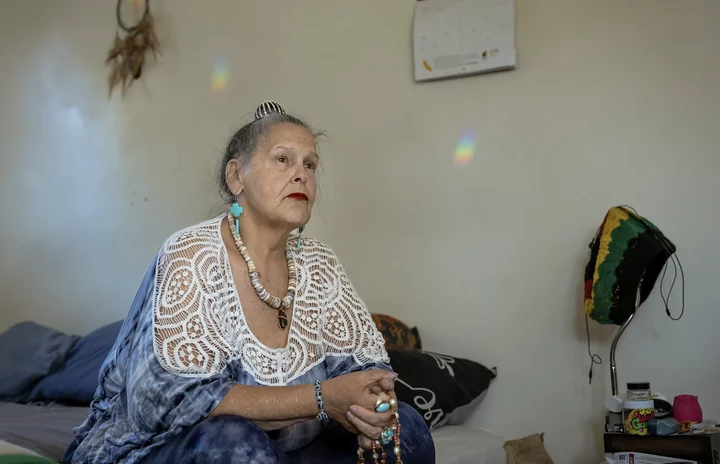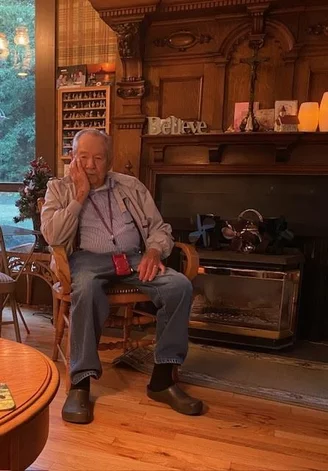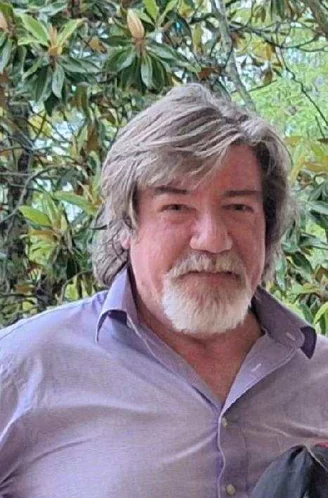WELCOME, NONI AND TULE: Sequoia Park Zoo’s Orphaned Black Bears Emerge Into Their New Play Space
Andrew Goff / Tuesday, Aug. 1, 2023 @ 10:26 a.m. / Cavy Babies
Sequoia Park Zoo release:
American black bears Noni and Tule arrived at the Sequoia Park Zoo in late May, and guests have been able to catch glimpses of them in their covered patio while they adjusted to their new home at the zoo. Now that the official quarantine period is complete, an industry standard across facilities accredited by the Association of Zoos and Aquariums (AZA), Noni and Tule will be more visible to guests as they begin to explore the west area of their new habitat. This dynamic space, affectionately called the bears’ “backyard,” includes snags for climbing, logs for play and foraging, and a variety of native berries to eat.
“Noni and Tule are showing themselves to be naturally curious, playful, and highly motivated by enrichment toys and food - all of which are positive signs for our animals and staff,” said Sequoia Park Zoo Animal Curator Amanda Auston. “We look forward to sharing updates as Noni and Tule thrive and grow with us.”
Noni also likes to chew
As cubs, Noni and Tule were found orphaned in the wild and taken to Lake Tahoe Wildlife Care (LTWC) for rehabilitation. Although unrelated, the cubs bonded during their time at the care center and were often seen wrestling, chasing, and socializing with each other on the LTWC webcam. California Department of Fish and Wildlife evaluated the bears and determined that they were unable to be released, and it was decided that Noni and Tule would make the move to Sequoia Park Zoo.
Visitors can observe Noni and Tule from the guest boardwalk or look down on the new habitat from vantage points on the Redwood Sky Walk. The public is reminded to be quiet, calm, and respectful when viewing the bears, which will help the animals adapt to the new space successfully and with minimal stress.
Animals at Sequoia Park Zoo have many opportunities to demonstrate a full range of natural behaviors and incredible adaptations, and the bears decide whether they want to forage through the habitat, play in the patio, or nap in an indoor den throughout the day. Depending on where they choose to be, they might not always be visible to guests.
Visitors to the Sequoia Park Zoo are encouraged to check the posted schedule upon arrival for more information on animal feedings and zookeeper talks.One ticket provides access to both the Sequoia Park Zoo and the popular Redwood Sky Walk experience. More information, including ticket pricing and hours of operation, is available at sequoiaparkzoo.net.
BOOKED
Today: 5 felonies, 11 misdemeanors, 0 infractions
JUDGED
Humboldt County Superior Court Calendar: Friday, Feb. 20
CHP REPORTS
No current incidents
ELSEWHERE
RHBB: City of Arcata Hosting ‘Water Rates Workshop’ February 25, April 15
The Atlantic: The Protein-Bar Delusion
The Atlantic: The Decline of Reading: The Orality Theory of Everything
Governor’s Office: Here’s how many medals Californians have brought home from Milano Cortina 2026 for Team USA
Medical Cannabis Paved the Way for Legalization in California. Now Patients Feel Left Behind
Alexei Koseff / Tuesday, Aug. 1, 2023 @ 8:47 a.m. / Sacramento
Bonnie Metcalf meditates at her Sacramento home on July 20, 2023. Metcalf suffers from sarcoidosis, an inflammatory disease, and takes cannabis products to ease the pain. Photo by Rahul Lal for CalMatters
Turn off Highway 99 in rural Elverta, drive five miles down the road and you’ll find a dusty lot crammed with cars on this scorching Friday evening. Behind the wooden fence, for a $10 entry fee, awaits a gathering akin to a block party crossed with a high-potency farmers market.
Alongside shirtless young men displaying jars of weed and decorative bongs, there are tacos and smoothies for sale. A woman in cannabis leaf-patterned shorts peruses the merchandise, while another with a severe black bob offers dab hits near the front. The DJ occasionally interrupts his mix of throwback hip-hop tunes (do you enjoy Coolio’s “Fantastic Voyage”?) to sell tickets for a raffle raising money for one vendor’s comatose employee.
Next to his booth, a table gives out free cannabis for veterans, who don’t have to pay to get into the event. Neither do patients with a doctor’s recommendation, like Dannie, a barber who was shot three times in his left arm and smokes cannabis to manage pain often inflamed by cutting hair.
Dannie, who agreed to be identified only by his first name, said he carries a medical recommendation because it’s safer should he ever get stopped by the police. But he still prefers buying weed at these clandestine pop-ups, where the products are more potent than at a dispensary.
“I’d rather spend my $30 on something that lasts,” he said.
This is just one of four unlicensed cannabis “seshes” in the Sacramento area that Bette Braden will host this week, as she does every week. The events started eight years ago for medical marijuana patients in an era of looser regulations, before California legalized recreational sales.
Since 2016, when voters approved Proposition 64, the initiative that authorized a commercial cannabis market in the state, Braden has come to view her seshes as both a business opportunity and an act of protest. Like many longtime advocates, she believes all weed use has a medical purpose, and considers it immoral that high taxes and a lack of dispensaries have made it inaccessible to many patients.
“The laws are so hideous,” Braden said, as she supervised from a camp chair near the entrance. “I used to be an activist. Now I’ve gone over to the underground.”
‘No one really cares about the medical side’
Frustration runs deep among medical cannabis patients and advocates who — by persuading voters to pass Proposition 215 in 1996 — paved the way for legal weed in California, but now feel left behind in a post-Proposition 64 era. In a profit-centered system focused on recreational sales, they argue there is little consideration for patients and their unique needs.
Collectives that once provided cannabis and community largely dissolved nearly five years ago, as California transitioned to a new regulatory framework based around licensed growers and retailers. Dispensaries, which are still prohibited in many parts of the state by local rules, have not widely embraced a replacement program that allows them to donate medical marijuana to patients who cannot afford to buy it. Medical identification cards, which can cost several hundred dollars to renew annually, confer few tangible benefits.
“No one really cares about the medical side, and that’s a mistake, because that’s where the value is,” said Richard Miller, who has promoted patients’ rights at the state Capitol for nearly two decades as a member of the American Alliance for Medical Cannabis and Americans for Safe Access. “I’ve been feeling over the past year like my work is a failure.”
The shift to treating medical marijuana users more like customers is especially tough for older patients with limited incomes and those with chronic conditions who need a large amount of cannabis for treatment. While California physicians can recommend cannabis for conditions including arthritis, glaucoma, migraines and seizures, most health insurance plans do not cover medical marijuana because it remains illegal at the federal level.
So some cost-conscious patients seek other ways of getting their supply, such as the underground seshes sprouting up around the state. That further bolsters an illicit market that California has struggled to bring under control and alarms advocates who want patients to have high-quality, safe medicine.
“There are some things in this world that should not have a f — ing price tag. And feeling good when you’re sick is f — ing one of them,” said Bonnie Metcalf, who lives in Sacramento County and suffers from sarcoidosis, a disease of the immune system that fills her body with lumps of inflamed cells called granulomas.
With an $1,100 monthly disability payment her only income, Metcalf said she cannot afford dispensary prices and relies on friends and Braden’s pop-ups for cannabis.
“It ain’t funny no more. My life is being messed with,” she said. “I should not have to continue to do this, to have to, you know, search out ways of finding the only medicine that has ever helped me in a way that I can still have a value to my life.”
‘It’s nothing but pain’
Metcalf’s body is snap, crackle, popping as she rolls into the living room in her motorized wheelchair for breakfast. An excruciating tingle runs from her neck and shoulders down through her hips and legs, she said, like a limb that has fallen asleep. It’s a dull, aching, don’t-fricking-talk-to-me kind of feeling, the same agony she wakes up to every day “until I get some pot in me.”
“As soon as I hit this reality, it’s nothing but pain,” Metcalf said. “It’s the first thing I think about. Because how can it not be?”
Metcalf does not like the side effects she experienced with pharmaceuticals — she took a steroid for her lungs that she said gave her diabetes — so she primarily sticks to cannabis and meditation to treat her sarcoidosis.
“It’s very strange, because there’s a point you get to where you don’t give a f — that you have pain. You’re so euphoric,” she said. “People would say, ‘Oh, you’re just doing it to get high.’ Well, yeah, dude, I would rather be in a euphoric state of mind than, you know, I can’t get comfortable. You can’t eat. Your muscles are constantly spasming. I’m on hot water bottles. I mean, it’s ridiculous.”
 Bonnie Metcalf prepares to take a cannabis-based product during her medicating session at her residence in Sacramento on July 20, 2023. Photo by Rahul Lal for CalMatters
Bonnie Metcalf prepares to take a cannabis-based product during her medicating session at her residence in Sacramento on July 20, 2023. Photo by Rahul Lal for CalMatters
Cannabis has been part of Metcalf’s life for decades: Now 61, she said she first smoked weed at the age of 8, when an older teen gave her a joint at the park, and became an activist for cannabis access as a teenager.
While living in San Francisco in the 1980s, she worked with cancer and HIV/AIDS patients, Metcalf said, advocating for them to be able to use cannabis in medical settings. She collected signatures for the initiative that legalized medical marijuana and, after it passed in 1996, moved home to Yuba County, where she opened her own cooperative. Metcalf said she would drive a bus of patients down to San Francisco twice a month so they could see a doctor and get their paperwork in order.
That ended after 11 years, when Metcalf became too disabled to run the collective any longer. Despite her activism, however, she now refuses to get a doctor’s recommendation or a medical card or shop at dispensaries. She’s furious at how Proposition 64 commercialized cannabis in California, prioritizing getting high over medication and pushing aside longtime activists, growers and mom-and-pop businesses with expensive licenses and regulations.
“The system that exists is bulls–t,” she said. “These rich people are paying more for packaging and branding than they are worried about medicine for people. They don’t care. It’s not a medicine to them. It’s just another money-making scheme like beer or cigarettes.”
After eating a sausage scramble with green onions, Metcalf follows a meditative routine to help her mind vibrate above the pain. For her daily sacraments, she burns a bay leaf, a bundle of sage and a stick of palo santo, waving them around her body and each door in the house. She takes off her shoes and sits in the backyard for a few minutes, sticking her bare feet into the dirt to ground.
Finally, it’s time to medicate. Metcalf said she can no longer smoke weed because of the granulomas in her lungs. Instead, she takes two daily doses of FECO, a highly-concentrated cannabis extract — one in the morning to relax her body and one in the evening to help her sleep.
 Bonnie Metcalf lights sage during her morning routine at her Sacramento home on July 20, 2023. Metcalf spreads the smoke to entrance and exit points to clear negative energy and promote relaxation. Photo by Rahul Lal for CalMatters
Bonnie Metcalf lights sage during her morning routine at her Sacramento home on July 20, 2023. Metcalf spreads the smoke to entrance and exit points to clear negative energy and promote relaxation. Photo by Rahul Lal for CalMatters
Back in her room, Metcalf turns on a playlist of affirmations by the musician Toni Jones and says a silent prayer (“May all beings live in peace, harmony, love and bliss”). Then she dips a fork into her jar of FECO and puts a dab of the oil on her tongue. She spits a chunk back into the jar, then bites another piece off the fork, until she estimates that she has half a gram.
The sensation starts in her head. She can feel her blood pressure calm. Her eyes relax and she sees the world in a whole different way. Everything is sparkly.
“It’s like a rain. It just starts raining,” she said, as the relief slowly washed down her body, loosening her joints before arriving, finally, at her feet.
“As long as my mind is high, I can control the body,” she said. “I can choose to disconnect from the pain. I can choose to put it in the background.
‘Our whole system fell apart’
Though it was the first state in the country to legalize medical marijuana with Proposition 215, California has always had a fraught relationship with it.
The Compassionate Use Act allowed people with a valid doctor’s recommendation, as well as their caregivers, to cultivate cannabis for their personal medical use — opening the door for collectives where patients unable to grow their own medicine could pool their resources to pay “caregivers” to do it for them. Compassionate care programs offered weed to the sickest and poorest patients for minimal or no cost.
But federal pressure from the “War on Drugs” remained, and the state was reluctant to jump into regulating medical cannabis until 2015, largely leaving the task to local jurisdictions. Writing recommendations became a lucrative business for some unscrupulous physicians, while illicit operators took advantage of the enforcement gaps to open hundreds of what were functionally retail dispensaries, enhancing skepticism about the legitimacy of the medical marijuana system.
That changed in 2019, after the passage of Proposition 64, when California began requiring collectives to get licensed like a commercial dispensary. Unable to complete the expensive and complex process, many shut down. More than 60% of cities and counties in the state still ban cannabis retailers, even for medical use, though starting in January, they can no longer prohibit medical cannabis delivery.
“Overnight, our whole system fell apart,” said Valerie Corral, founder of the groundbreaking cooperative Wo/Men’s Alliance for Medical Marijuana in Santa Cruz. “They were so busy counting tax dollars that they put us all out of business.”
Corral received a license, but she sold it after it became clear opening and operating a dispensary would cost hundreds of thousands of dollars that her donation-based organization did not have. Now she grows cannabis and works with local dispensaries to donate it for free to patients — the result of a 2019 law that, after a multiyear effort, established a replacement to California’s traditional compassion programs.
Leona Powell, a former member of Corral’s collective who smokes weed daily to deal with lingering pain from a 1978 airplane crash, said she misses volunteering in the garden and connecting with other patients at weekly meetings, where they would share information and potluck dinners. Living primarily on Social Security payments, the 75-year-old Powell said she relies on donated cannabis from a local dispensary, because she otherwise cannot afford the price of a standard eighth of an ounce, which typically costs $40 or more plus tax.
“That’s only a couple of joints. That’s two days’ worth. Now what?” she said. “I don’t have that kind of money.”
Efforts to formalize the medical marijuana system in California also lagged. In 2003, the state established a medical identification card for patients, mainly as a way to defuse interactions with law enforcement, but made it voluntary. Few people applied for one, perhaps afraid to register themselves with the government — though some activists did as a political statement.
At its peak, in the 2009-10 fiscal year, counties issued 12,659 annual medical cards, according to data from the state Department of Public Health. Surveys at the time estimated hundreds of thousands, if not more than a million, medical cannabis patients in California. By last year, the number of medical cards dropped to just 3,218, among the lowest on record.
Advocates say there is little reason to get a card, which carries an annual fee of as much as $100, on top of the cost of the doctor’s recommendation. With the card, patients are exempted from the state sales tax on their cannabis but not other state and local taxes, so they would need to spend hundreds of dollars per month at a dispensary to realize any savings. Californians can also get medical cards before they turn 21, when it is legal to buy weed for recreational use, and cardholders can purchase more cannabis per day.
“There’s a tendency to be dismissive of cannabis users” among the medical establishment, which is then reflected in policy, said William Dolphin, a University of Redlands lecturer who researches and writes about medical cannabis. “We’ve seen across the country a desire to wash their hands of it.”
 Cannabis products on display at A Therapeutic Alternative in Sacramento on July 19, 2023. Photo by Miguel Gutierrez Jr., CalMatters
Cannabis products on display at A Therapeutic Alternative in Sacramento on July 19, 2023. Photo by Miguel Gutierrez Jr., CalMatters
The state Department of Cannabis Control points to extensive testing and labeling requirements in the licensed market as a major benefit for patients, ensuring that Californians with potentially compromised immune systems are not using products tainted with hair, rat feces, heavy metals, illegal pesticides or mold.
In May, the department awarded UCLA two grants to study medical cannabis use in California, including what conditions patients are treating, what products they prefer and how they are accessing them.
“If they’re turning to the unlicensed market, we want to understand why they’re doing that so we can craft policies to bring them into the licensed market,” said Devin Gray, a policy analyst with the department’s policy and research division.
‘We sell products to stay alive’
Even dispensaries and other organizations dedicated to the philanthropic tradition of compassionate care are struggling amid a broader industry downturn.
Kimberly Cargile owns A Therapeutic Alternative, which opened in a converted house near downtown Sacramento in 2009 to serve medical marijuana patients. These days, it also has a license for recreational sales — and one of the only compassion programs in town, allowing low-income patients to receive cannabis for free.
Cargile said many dispensaries are reluctant to establish these programs because of the expense. Hers, serving an estimated 200 people, runs between $1,000 and $2,000 per month for staff time to manage applications, intake stock and consult with patients.
That’s a bigger sacrifice than it used to be. After a statewide surge in cannabis sales during the early days of the coronavirus pandemic, Cargile said sales dropped by $3 million, or 20%, at her dispensary over the past two years. She’s been looking for savings everywhere she can to stay afloat, though the compassion program will remain a priority for as long as she can manage.
 Kimberly Cargile, CEO of A Therapeutic Alternative, at the dispensary in Sacramento on July 19, 2023. Photo by Miguel Gutierrez Jr., CalMatters
Kimberly Cargile, CEO of A Therapeutic Alternative, at the dispensary in Sacramento on July 19, 2023. Photo by Miguel Gutierrez Jr., CalMatters
“We’re doing everything we can to stay true to our mission,” she said. She doesn’t want a cancer patient to feel forced to turn to “dirty” products on the illicit market.
“The whole entire reason I’ve dedicated my life to patients’ rights is because I want them to have access to high-quality, lab-tested products to treat their symptoms,” Cargile said.
Jude Thilman, who runs Dragonfly Wellness Center in Fort Bragg, said it is financially impossible for cannabis businesses to focus solely on medical use anymore. That has meant dispensaries providing less education for consumers, manufacturers of therapeutic products shutting down because they cannot adapt to new rules and a heritage slowly disappearing. Of the seven medicine makers that Thilman personally knew before Proposition 64, she said five have gone under and the other two are operating illegally.
“We sell products to stay alive,” Thilman said, “and then we sell products to help people.”
Medical donations through compassion programs increased over the first three years of the 2019 law, according to data collected by the state Department of Cannabis Control, though the reach remains relatively small. Last year, 440 dispensaries reported donating cannabis products to patients, fewer than a quarter of California’s nearly 2,000 licensed retailers.
Retailers reported 13,278 donations in 2020, 41,775 donations in 2021 and 47,371 donations in 2022. Each donation is counted separately, so the number of patients served is likely much lower.
Advocates said they initially benefited from an oversaturated commercial market, with businesses donating more products that they could not sell. But in recent months, as a dramatic price drop caught up to growers and decimated cannabis communities, supply has been scarcer.
“What’s been heartbreaking is that extinction of all the small farmers who have been our most loyal donors,” said Ryan Miller, who founded Compassionate Veterans, until recently known as Operation EVAC, a program that combines peer support sessions with free cannabis to prevent suicides. “The corporations are not stepping up, to be honest.”
After his pioneering San Francisco collective had to stop handing out cannabis to patients in 2019, Joe Airone, known as Sweetleaf Joe, turned his attention to logistics for compassion programs, helping find and deliver donations. He said his efforts connected more than 3,000 patients with 1,600 pounds of free medical cannabis last year — but without more support, such as tax write-offs, for participating businesses, securing donations is getting more difficult.
“All of our partners are taking a financial hit to do this,” he said. “There’s no incentive to do this. Zero.”
‘How much are you really helping people?’
In spite of the triple-digit heat, Metcalf was among some 400 people who attended the underground marketplace in Elverta that Friday evening. After visiting with Braden, she stopped by a booth for The Sisters Edibles, where she sometimes buys gummies.
Metcalf eyed the table stacked with tubs of colorful CBD-infused bears and worms, packaged by the generous handful, available for $10 each or three for $25. It was a fraction of the cost of what she could get at a dispensary, where a tin with 10 doses would be $20 plus tax.
“If you limit it, how much are you really helping people?” said the owner, Jen, who said she started taking cannabis three years ago to treat her migraines and moved into manufacturing her own products to supplement her veteran disability payments. She declined to share her last name out of privacy concerns. “I have so many people who come up to me and say, ‘I can get out of bed now.’”
Metcalf continued on to find some weed for her caretaker. At another small booth, she held brown mason jars to her nose, inhaling the scents of dried cannabis flowers. Dank. Like a cheese.
“That has a nice little sweet kickback smell,” she said. “I’ll take a half.”
With only two $20 bills, Metcalf was $10 short of the price for half an ounce. The vendor, who asked to withhold his name so as not to jeopardize applications he has submitted for cannabis delivery and manufacturing licenses, waved it off.
Touched by his generosity, Metcalf asked for his number. She knew a lot of people who might want to order from him.
“Do you have a medical card?” he asked. He said he didn’t charge patients delivery fees.
Metcalf, a self-proclaimed outlaw, shrugged at the idea and threw up her middle fingers.
###
CalMatters.org is a nonprofit, nonpartisan media venture explaining California policies and politics.
OBITUARY: Leon Warmuth, 1933-2023
LoCO Staff / Tuesday, Aug. 1, 2023 @ 8:30 a.m. / Obits
Leon Thomas Warmuth was born into the depression in 1933 near the town of San Joaquin California, not far from Fresno. His dad, Otto, was a share cropper. His mother, Leona, picked cotton. He was the fifth of six children and had three sisters and two brothers.
Near the age of 12, it was recognized that Leon’s spine was afflicted with Scoliosis. He was sent to Shriner’s hospital in San Francisco which seemed in his best interest. This left Leon 6-7 hours from his home and family. Leon would spend over a year at Shriner’s getting therapy only.
When he returned home, the economy was well into World War II. His older brothers and sisters were all engaged in the military in some way. Leon was deemed unfit for the military, but with his brothers and sisters serving, and one brother having been shot down over Germany and becoming a prisoner of war, Leon became unwaveringly patriotic as many of that time did.
Leon was soon old enough to drive and with that came the beginning of independence. Leon graduated from Tranquility High School in 1951 and went on to Junior college with a special interest in automotive technology and fabrication. But Leon felt he needed a fresh start. He had a sister who lived here in Eureka, so in 1952 a brother bought Leon a bus ticket to Eureka. Another sister bought him a cardboard suitcase. Here he lived with his sister Wilma and her husband, Fred Butterworth. It wasn’t long and Leon bought an old fixer upper pickup and started his many new friendships in the car world of Eureka, starting with a number of folks from the Samoa air strip where they were drag-racing.
Leon’s first job was within the parts dept of the big truck shop of DeBon motors, later the Peterbilt truck shop, Finnigan & Nason Auto Parts and Gustafson Chevrolet but all these jobs were seasonal, so dad was always getting laid off
While working for Gustafson’s he was able to buy a one-year-old ‘55 Chevy. Cool had come to Leon. It was about this time pilots were complaining about drag racing at the air strip. Dad and several others solicited Eureka City Councilman Orval Wilson to help find a responsible place to drag race. This was the real foundation of the Samoa Drag Strip that we know today.
Somewhere in this mix of work and play, dad met my mother, Elaine Smith. Folklore says it was at Morrow’s Drive-In. They were married in early 1957. Son Dale was born in May 1958 and three years later they welcomed daughter, Carrie.
By this time, Leon had developed a following for all sorts of hot rod kind of work, so he felt confident enough to start his own auto repair business. Mom and Dad asked Mom’s Great-Uncle, George Hartman for a $900 loan. Why $900? Because it sounded like so much less than $1000, a fortune in those days.
First came the 2-bay shop at the corner of Fifth and Broadway, Leon’s Brake & Muffler, where Roy’s Auto Center is now. Within a year or so Mom and dad bought a tubing Bender; later…their first home. The business name got shortened to Leon’s Muffler Service. Then Dad moved the shop to 1460 Broadway which is about where Eureka Natural foods is now. Stock cars & drag cars came and went.
Dad helped foster Six Rivers Racing Association with a great group of other folks looking to have more control in the promotion of stock car racing.
In 1967, they bought their first commercial property right next to where our shop is now. In addition to exhaust, Dad added tires and wheels to his services. This purchase of 939 Broadway of course was the first of many commercial properties they purchased. Over a period of time mom and dad bought nearly that whole city block.
By this time, Dad had created a number of great lifetime friendships including Mel Sample, Mike Cahill, Rudy Zeck, Dennis Nilsen, Lane Strope, Steve Rosenburg, Gary Wahlund and Rich Keller. Dad also had a number of great employees /friends including Don Poor, Tim Milton, Bud Olsen, Dennis Manfredi, Mike Cahill, Jim Frasier Jr, Jerry Coles, Mark Laudenslager, Jake Pauli, Lori Hansen, Kevin Albonico and Mike Marlin to name a few.
Dad started drag racing less. Then he developed a relationship with Ferndale’s Jimmy Walker. Over a couple of years dad helped build two race cars for Jim and were quite successful at Redwood Acres, winning the track championship 2-3 times during their partnership.
In 1972, Dad had a hand in Bob Haveman’s Bonneville Salt Flat diesel land speed record streamliner that was build out at College of the Redwoods. That car, known as “The Corsair”, was clocked at over 250mph.
With the family-business well-established, Mom encouraged dad to spend more time with family. Dad took to gardening, and in 1972 they bought a country home out on the Klamath River near Bluff Creek. Here the whole family grew up.
About this time dad wrote a letter to the Eureka Chamber of Commerce complaining about what they should be doing. Next thing you know he was on the board of directors and went on to serve as President.
In about 1974, Dad’s back came back to haunt him and he had surgery in Oakland where a 10-inch long stainless steel rod was installed. The doctor stretched him 3 or 4 inches.
In 1979, Leon and Elaine bought their forever Home here in Eureka — 6 plus acres of forest in the city limits. Here they gardened in the most enormous ways. Carrie and her husband, Jerry Sams had two children, so Leon & Elaine had their grand kids. Emily Sams-Simmons and her husband Jonah Simmons, Lucas Sams and his wife Ashley Fullerton-Sams who have a daughter Jude Sams, great granddaughter to Leon and Elaine.
Dad still wanted to leave an auto repair facility for the ages. He and mom had what was ridiculous trust in what their children could build & manage, so in 1993, Leon’s Car Care Center opened in our new location at Broadway and Washington.
In semi-retirement, Leon went on to become one of the vintage Humboldt County post card kings, and the Prince of Facebook, introducing him to a whole new crowd of admirers.
Although he was most proud of his family, his long-time friends were a source of joy, also. Four to five of his long-time friends gathered every other Saturday at the “Warmuth Ranch” for coffee and donuts, stories and laughter. He also loved his Church Family at Immanuel Lutheran Church and asked to be baptized at the age of 72. He made amazing contributions to their garden and addition of the Fellowship Room.
Leon is survived by his wife of 66 years, Elaine. His son, Dale and wife Jeannemarie Baker-Warmuth, daughter Carrie and husband Jerry Sams. Granddaughter Emily and husband Jonah Simmons. Grandson Lucas and wife, Ashley Fullerton-Sams, and beloved great-granddaughter, Leola Jude Sams. He is also survived by his one remaining sister, Tedra Martin, her husband Frank and numerous nieces and nephews.
Leon was loved beyond measure and his legacy will live on forever in his family.
If you would like to make a memory donation in his name, he loved Immanuel Lutheran Church in Eureka and the Humboldt Botanical Gardens.
A celebration of his life is planned for early September.
###
The obituary above was submitted on behalf of Leon’s loved ones. The Lost Coast Outpost runs obituaries of Humboldt County residents at no charge. See guidelines here. Email news@lostcoastoutpost.com.
OBITUARY: Keith Hess, 1966-2023
LoCO Staff / Tuesday, Aug. 1, 2023 @ 6:56 a.m. / Obits
It is with heavy hearts that we announce the passing of Keith Hess, who died peacefully in his sleep on Tuesday, July 25, 2023. Keith was a beloved husband, father, friend, son, brother, and uncle. He leaves behind happy memories in so many hearts.
Keith grew up in the East Bay, where he enjoyed hunting with his dad and dad’s friends at Elk Creek. His father also taught him how to navigate the San Francisco Bay in their Boston Whaler, “the Kraken.” That love of fishing extended into Humboldt, where he fished the six rivers, Humboldt Bay, and the Pacific Ocean. In recent years, “the Kraken” became one of Keith’s favorite hobbies.
He had a tight-knit family and spent his childhood playing ball with cousins and neighborhood friends. He loved his Gramma and Grandpa Hess, staying over, drinking Dr Pepper at night, and having coffee in bed in the morning. He masterminded a French fry competition between both sets of grandparents to ensure he and Jen always had the best fries. He loved his father, Dean; mother, Karen; and sister, Jen, fiercely.
His high school friends, the Vagrants, from Bishop O’Doud got into all kinds of mischief and fun. Keith had a talent for making friends with just about anybody, a stranger to nobody. He was fiercely loyal and always willing to help a friend in need without question.
He graduated from Humboldt State University in 1994 with a Bachelor of Science in Natural Resources Planning. While at HSU, rugby became a passion. At one point, the only class he was taking was rugby. Keith became a legend among the rugby community. He played Division I for HSU in the late ‘80s when Humboldt would play against teams like Cal Berkeley and Stanford. After graduating, Keith and other graduates started the Old Growth Men’s program. In those days, eleven guys would travel to play games without ever practicing, finding players on the way. His familiar knock on the door, accompanied by his characteristic exclamation, “Hey fool, we are going to Chico!” will be etched in the memories of all who experienced his enthusiasm. Every year at alumni events, you would find Keith helping the youth learn the game (well, the game as he saw it). He enjoyed traveling with the Bald Eagles Over 45 team, touring with the select side.
The relationships he built were always at the forefront of his career in natural resources. He worked on many projects in both private consulting and with the Army Corps of Engineers, including wetland delineations, gravel extraction permitting, environmental impact reports, statements, and fire cleanups in California. He worked on so many sites for so many people that the number of keys hanging from his keychain broke the ignition in his truck. He was most proud of his extensive work within the gravel community in Humboldt County, and his dedication to them is beyond description.
Keith was an extraordinary and generous man who lived life with passion and kindness. He was always available to help the down-and-out. He will be fondly remembered as a rugby legend and cherished friend, at times an ass, but always loyal. But most of all, he loved his children, Jade, Rachel, and Jessie, and his wife, Karna. His family was his greatest and fiercest passion and joy. They remember him as the loudest man on the sideline, cheering them on and pushing them to be better, arguing while watching TV, and knowing the depth of his love. As the coach of a Fortuna High rugby team he helped found for his kids, he was a passionate man who lived and loved big.
A memorial to honor Keith’s life will be held on August 5th, on the Van Duzen River, Exit 685, at 5 p.m. Please bring a camp chair, blanket, all-wheel vehicle, and a dish to share. Signs will be posted at the exit, or you may send a message to khessmemorial@gmail.com for more information.
###
The obituary above was submitted on behalf of Keith Hess’ loved ones. The Lost Coast Outpost runs obituaries of Humboldt County residents at no charge. See guidelines here. Email news@lostcoastoutpost.com.
More Grant $$$! Rotary Club of Eureka Offering $100K for One Community Project That Benefits Residents
LoCO Staff / Monday, July 31, 2023 @ 3:51 p.m. / Community Services
Photo by Giorgio Trovato on Unsplash
###
Press release from Rotary Club of Eureka:
In honor of its centennial year, the Rotary Club of Eureka is offering a single $100,000 grant from the Glyndon “Sign” and Ruth Smith Endowment Fund to a community project that benefits residents in the greater Eureka area.
The purpose for the grant, through Humboldt Area Foundation and Wild Rivers Community Foundation, is to support charitable organizations and projects. International projects will be considered providing a non-USA Rotary Club is involved. Applications will be accepted from July 24 through Sept. 4.
In years past, the Rotary Club has distributed “Sign” & Ruth Smith grants for numerous community projects with grantees including the Northern California Blood Bank, Food For People, Redwood Art Association, and Humboldt Trails Council.
The Rotary Club of Eureka, which celebrates its centennial in October, will consider projects that may need other sources of funding to complete the work, providing that there is sufficient funding from all sources to complete the project in a reasonable amount of time.
About the fund:In 1996, the Rotary Club received a gift of nearly $700,000 from the estate of one of its former members, Mr. Glyndon “Sign” Smith and his wife, Ruth. The funds are held and invested by the Humboldt Area Foundation and Wild Rivers Community Foundation. The annual proceeds are awarded as grants each year.
Visit the Rotary Club of Eureka website at www.rotary1.org/
For more information about HAF+WRCF, visit hafoundation.org.
Humboldt County Will Soon Transition to Voter’s Choice-Style Elections, and the County Wants Your Input
LoCO Staff / Monday, July 31, 2023 @ 3:13 p.m. / Elections , Local Government
###
Press release from the Humboldt County Elections Office:
The Humboldt County Office of Elections is seeking input from Humboldt County voters on the county’s draft Election Administration Plan (EAP).
Background
The County of Humboldt will soon be transitioning to the California Voter’s Choice Act (VCA) elections format. Approved by California lawmakers in 2016, and established by Senate Bill 450, the VCA expands voters’ options for how, when and where they cast their ballots by:
- Mailing every voter a ballot.
- Expanding in-person early voting.
- Allowing voters to cast a ballot at any vote center within the county.
- Providing secure ballot drop off locations throughout the county.
Under California law the Office of Elections is required to submit an EAP that describes how the County of Humboldt will administer elections under the VCA. To meet the state’s requirements, the Office of Elections must engage voters on the draft EAP and gather public feedback.
The county’s draft EAP can be reviewed at humboldtgov.org/VotersChoiceAct.
Public Comment
Public comment on the draft EAP will be accepted until Wednesday, Aug. 16 at noon. Feedback can be submitted through the online submission form, by email at humboldt_elections@co.humboldt.ca.us or over the phone at (707) 445-7481.
Additionally, the Registrar of Voters will hold a public hearing to discuss the draft EAP on Thursday, Aug. 17 from 6 to 8 p.m.at Arcata City Hall in the Council Chamber, located at 736 F St., Arcata, CA. Community members are invited to attend and participate in person or on Zoom to share their input. For more information on the public hearing, call (707) 445-4841.
For more information on the Voter’s Choice Act, please visit the California Voter’s Choice Act website.About the Humboldt County Office of Elections
The Humboldt County Office of Elections is committed to ensuring all eligible residents have an opportunity to exercise their right to vote; conducting elections in a fair, accurate, and efficient manner; and providing reliable information and the best possible service to voters, districts, candidates, and other interested parties. For more information, visit humboldtgov.org/elections.
Coast Central Credit Union Offering Grants of $3,000-$25,000 to Local Organizations
LoCO Staff / Monday, July 31, 2023 @ 2:42 p.m. / Community
Photo by Alexander Mils on Unsplash
###
Press release from Coast Central Credit Union:
Coast Central Credit Union (CCCU) announced that the fall 2023 round of its Community Investment Program is now open. With the Board of Directors’ approval of an increase up to $300,000 in grants annually, $150,000 is available this round to support local organizations throughout Humboldt, Del Norte, and Trinity counties. Grant amounts generally range from $3,000 to a maximum of $25,000, and there are usually 8 to 12 recipients. The giving program was created in 2008, and since then has awarded a total of over $2 million to more than 200 organizations throughout its tri-county service area.
New change: applications are now due directly to Coast Central via email at marketing@coastccu.org or by mail to Coast Central Credit Union Marketing Department, 2650 Harrison Ave., Eureka, CA 95501. To apply and for more information, visit coastccu.org under the Community tab. For question, contact VP Marketing & Communications Colleen Toste at (707) 445-8801 x 1309 or ctoste@coastccu.org. Applications must be received by 5 pm on Thursday, August 31. Recipients will be announced mid-October.
In 2023 CCCU is on track for an unprecedented $650,000 in total community giving through its grant, sponsorship, and college scholarship programs. Additionally, its employees have volunteered over 3,000 hours year to date throughout its three counties. Through banking with CCCU, individuals and businesses directly support these efforts.Coast Central Credit Union is the largest member-owned financial institution in the area, with $2 billion in assets, nearly 77,000 members, and operating 11 Member Services Branches throughout Humboldt, Del Norte and Trinity counties, including McKinleyville, open six days a week and Bayshore Mall, open seven days a week. Members also have free access to Online and Mobile Banking and a fee-free network of 30,000 ATMs nationwide. More information is available at coastccu.org, facebook.com/coastcentral, @coastccu on Instagram, or by calling (707) 445-8801.








